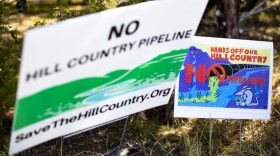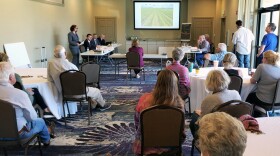Construction on a hotly contested natural gas pipeline through the Texas Hill Country could proceed quickly after a federal judge on Friday declined opponents’ request to temporarily block the project.
U.S. District Judge Robert Pitman wrote in an eight-page decision that Central Texas landowners, the City of Austin and other local governments had not proven they would suffer “irreparable harm” if Houston-based Kinder Morgan is allowed to move forward on the Permian Highway Pipeline while litigation against it continues.
“We are pleased with the decision and look forward to continuing construction on this vital infrastructure project,” Kinder Morgan said in an emailed statement.
The pipeline has been the subject of heated debate and multiple lawsuits in Texas since it was first announced in 2018.
The 430-mile, $2 billion project would carry natural gas from a transport hub in the booming West Texas oil patch to hungry markets on the Gulf Coast. Opponents, including many Central Texas landowners, worry the pipeline could threaten federally protected animals and sensitive underground aquifers that feed the region’s popular swimming holes, among other concerns.
In the case before Judge Pitman, opponents claim Kinder Morgan is flouting the Endangered Species Act and other environmental regulations in a rush to finish the pipeline.
The plaintiffs specifically claim construction on the project would harm federally protected birds and salamanders. They say the company is therefore required to obtain federal permits to “take” the animals but has failed to do so.
Kinder Morgan has denied the allegations, saying the company is “in full compliance with the Endangered Species Act.”
Much of the lawsuit has centered on claims that the pipeline could harm protected golden-cheeked warblers. In Friday’s decision, the judge appeared sympathetic to that concern, but said it was not significant enough to warrant blocking construction.
“While the court appreciates plaintiffs’ arguments and has concerns about the fate of the warblers whose habitat is in the path of the pipeline, the court cannot grant a [temporary restraining order] at this juncture when plaintiffs have not met their burden of a showing of irreparable harm to the species as a whole,” Judge Pitman wrote.
Attorneys for the plaintiffs did not immediately respond to a request for comment.
The decision means the company could move quickly to clear land for the pipeline through parts of Central Texas over the next two weeks.
Kinder Morgan began work on the project’s western stretches last year, but its progress into the hill country stalled as the company waited for regulatory approval from the U.S. Army Corps of Engineers.
The company received that approval earlier this week, according to court documents.
Now, under direction from the U.S. Fish and Wildlife Service, the company has to finish clearing land through warbler habitat by March 1, before the start of the birds’ breeding season.
Kinder Morgan had used that timeline in court to argue against blocking the project, saying that if the early March deadline isn’t met, the entire project will be halted for six months, costing the company at least $135 million.
“With a very small window of time remaining for [Permian Highway Pipeline] to perform clearing work – which is being undertaken in assiduous compliance with all federal regulations – an injunction of any length will have a devastating impact on PHP and the pipeline,” attorneys for the company said in court filings.
Opponents, meanwhile, argued their broader case against the pipeline would be made irrelevant if the company finishes building through the sensitive areas at the center of the case.
In explaining his decision, Judge Pitman pointed to a formal opinion from the Fish and Wildlife Service that the pipeline would not pose an existential threat to the warbler species.
“Accordingly, at this time, the potential injury does not rise to the level of being irreparable,” Pitman wrote. “Rather, the injury is limited in terms of takes and destruction of habitat due and the effect will be mitigated by the conservation measures Kinder Morgan has and will take pursuant to the Biological Opinion.”
___________________________________________________




